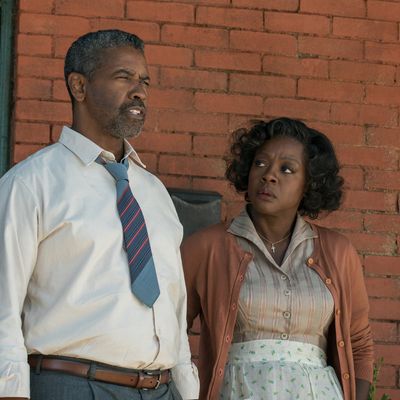
In his play Fences, August Wilson brings only a small piece of the world onstage — the backyard of a black Pittsburgh sanitation worker, Troy Maxson, in the 1950s — but that piece is enough. As in Chekhov, the major events happen offstage, but what Wilson shows is more important, dramatically: the reverberations of those events over time for the family and the next generation. In the hands of a great naturalistic dramatist, the stage is the world. In the hands of a less-than-great film director, the stage is … a stage.
That’s uncharitable to the work of Denzel Washington, who directs and plays Troy in the new adaptation of Fences and whose work is intelligent. But the movie is pitched in an unfortunate place. It’s not cinematic enough to make you forget you’re watching something conceived for another, more spatially constricted medium, but it’s too cinematic to capture the intensity, the concentration, of a great theatrical event. Audiences watch it dutifully but at arm’s length.
There’s a literal fence at the center of Fences, but it doesn’t resonate onscreen the way it does onstage. It’s not a living metaphor. Troy, a gifted baseball player, was fenced-out of the major leagues when he was young but was too old to strut his stuff when he emerged after a long stint in prison. Now, he sees fences everywhere. The fence that he’s building, though, underscores the barrier he has erected between him and his sons, one from each of his marriages. Wilson recognized the historical injustice against black people, but as a dramatist, he was less engaged by victimhood than by the violence that victims commit against one another.
Washington is a dynamic performer, but he doesn’t have the gravity of James Earl Jones, who played the role in the play’s original production. He starts at so high a pitch that he has nothing to build to. As his wife, Viola Davis is very fine, but it’s a reactive part, with a hint of Arthur Miller’s “attention must be paid” in her final soliloquy. Russell Hornsby and Jovan Adepo are excellent as Troy’s sons, and Mykelti Williamson will survive the heavily symbolic part of the brain-damaged, Gates of Heaven trumpet-blowing brother. But the actor who registers most fully is playing the character who does the least: Stephen Henderson as Troy’s pal, Jim Bono. Our eyes drift to his weathered face as he watches the histrionics because he’s our way into the action — a playgoer.
*This article appears in the December 26, 2016, issue of New York Magazine.


